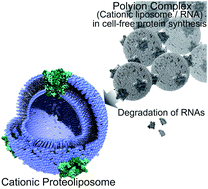We are very pleased to introduce Dr Mitsuru Ando, first author of the paper ‘Preparation of cationic proteoliposomes using cell-free membrane protein synthesis: the chaperoning effect of cationic liposomes‘. His article has been very well received and handpicked by our reviewers and handling editors as one of our September HOT articles. Mitsuru told us more about the work that went into this article and what he hopes to achieve in the future. You can find out more about the author and his article below and find more HOT articles in our online collection.
Meet the authors
 Dr Mitsuru Ando received his undergraduate degree in Polymer Science and Engineering in 2007 from Kyoto Institute of Technology by under the supervision of Professor Akira Murakami. He received his master degree and Ph.D. in Pharmaceutical Sciences from Kyoto University by under the supervision of Professor Yoshinobu Takakura in 2010 and 2013, respectively. After graduation, Dr. Ando has been a postdoctoral fellow at Graduate school of pharmaceutical sciences (2013-2014) and at the Department of Polymer Chemistry, Graduate school of Engineering, Kyoto University (2014-date). His research project focuses on membrane protein science, drug delivery system and synthetic biology.
Dr Mitsuru Ando received his undergraduate degree in Polymer Science and Engineering in 2007 from Kyoto Institute of Technology by under the supervision of Professor Akira Murakami. He received his master degree and Ph.D. in Pharmaceutical Sciences from Kyoto University by under the supervision of Professor Yoshinobu Takakura in 2010 and 2013, respectively. After graduation, Dr. Ando has been a postdoctoral fellow at Graduate school of pharmaceutical sciences (2013-2014) and at the Department of Polymer Chemistry, Graduate school of Engineering, Kyoto University (2014-date). His research project focuses on membrane protein science, drug delivery system and synthetic biology.
Could you briefly explain the focus of your article to the non-specialist (in one or two sentences only) and why it is of current interest?
Our article describes the investigation of the effect of cationic liposome, one of the drug delivery system scaffolds, on cell-free membrane protein synthesis and the preparation method of the bioactive membrane protein reconstituted cationic liposomes.
How big an impact could your results potentially have?
Our study provides the advanced drug delivery system based on combination of membrane protein-guide with cationic liposomes. This cationic proteoliposome has the potential of highly specific interaction with target ligand on plasma membrane and more efficient delivery of encapsulated liposomal content through improvements to cellular attachment, fusion and ultimately delivery.
Could you explain the motivation behind this study?
Since membrane proteins in modulating cellular homeostasis, they are expected for their use in advanced applications. However, compared with the soluble protein science, the membrane protein science is still quite preliminary. We hope to use membrane proteins as a membrane protein-conducted drug delivery targeting materials and biosensor chips.
In your opinion, what are the key design considerations for your study?
A key point for this study is to control the surface positive charge of liposome and the concentration of cationic lipids.
Which part of the work towards this paper proved to be most challenging?
The most challenging aspect is the optimization of cationic lipid contents and concentrations under cell-free protein synthesis to control droplet-like polyion complexes.
What aspect of your work are you most excited about at the moment?
At this moment, we are very excited in establishing the preparation method of cationic proteoliposomes to open the advanced drug delivery system pivoted membrane protein science.
What is the next step? What work is planned?
In the next step, we plan and performe to use other membrane protein-reconstituted cationic liposomes in the membrane protein-conducted drug delivery strategy.
Preparation of cationic proteoliposomes using cell-free membrane protein synthesis: the chaperoning effect of cationic liposomes
Mitsuru Ando, Yoshihiro Sasaki and Kazunari Akiyoshi
RSC Adv., 2020,10, 28741-28745
DOI: 10.1039/D0RA05825D, Paper
 Submit to RSC Advances today! Check out our author guidelines for information on our article types or find out more about the advantages of publishing in a Royal Society of Chemistry journal.
Submit to RSC Advances today! Check out our author guidelines for information on our article types or find out more about the advantages of publishing in a Royal Society of Chemistry journal.
Keep up to date with our latest HOT articles, Reviews, Collections & more by following us on Twitter. You can also keep informed by signing up to our E-Alerts.











